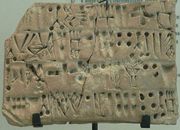Elamite language
| Elamite | ||
|---|---|---|
| Spoken in | ||
| Region | Middle East | |
| Language extinction | by the end of the 4th century BC | |
| Language family | possible language isolate, but see Elamo-Dravidian languages | |
| Language codes | ||
| ISO 639-1 | None | |
| ISO 639-2 | elx | |
| ISO 639-3 | elx | |
| Linguasphere | ||
| Note: This page may contain IPA phonetic symbols in Unicode. | ||

Elamite is an extinct language spoken by the ancient Elamites. Elamite was an official language of the Persian Empire from the sixth to fourth centuries BC. The last written records in Elamite appear about the time of the conquest of the Persian Empire by Alexander the Great.
Contents |
Elamite scripts
Over the centuries, three distinct Elamite scripts developed.
- Proto-Elamite is the oldest known writing system from Iran. It was used during a brief period of time (ca. 3100 – 2900 BC); clay tablets with Proto-Elamite writing have been found at different sites across Iran. The Proto-Elamite script is thought to have developed from early cuneiform (proto-cuneiform). The Proto-Elamite script consists of more than 1,000 signs and is thought to be partly logographic. Since it has not yet been deciphered, it is not known whether the language it represents is Elamite or another language. It has been suggested that some early writing systems, including Proto-Elamite, may not relate to spoken languages in the way that modern writing systems do.
- Linear Elamite is a writing system from Iran attested in a few monumental inscriptions only. It is often claimed that Linear Elamite is a syllabic writing system derived from Proto-Elamite, although this cannot be proven. Linear-Elamite was used for a very brief period of time during the last quarter of the third millennium BC. Linear-Elamite has not been deciphered. Several scholars have attempted to decipher linear-Elamite, most notably Walther Hinz and Piero Meriggi.
- The Elamite Cuneiform script was used from about 2500 to 331 BC, and was adapted from the Akkadian Cuneiform. The Elamite Cuneiform script consisted of about 130 symbols, far fewer than most other cuneiform scripts.
Linguistic typology
Elamite was an agglutinative language, and Elamite grammar features case agreement between nouns, called Suffixaufnahme. It also had the unusual feature of having a class of animate nouns with separate markers for 1st, 2nd, and 3rd person.
Relations to other language families
Elamite is mostly thought to have no close relation to the neighboring Semitic languages, to the Indo-European languages, or to Sumerian, even though it adopted the Sumerian syllabic script.
Elamo-Dravidian versus Afro-Asiatic
There have been two promising attempts at categorization. In one, an Elamo-Dravidian language family, consisting of Elamite and the Dravidian languages, was carried from Elam to India by eastward migration; this is the view proposed by David McAlpin. In the other, proposed by Václav Blažek, Elamite is more closely related to the Afro-Asiatic languages, perhaps forming a distinct subfamily within that group. However, these are only hypotheses and are fraught with uncertainty. Comparisons in vocabulary between Ĥapirti (ʕēlamite) and East Caucasian (as well as other language-families, including Altaic) are also presented in the "Word-list" in Starostin, pp. 8–22.
References
- Khačikjan, Margaret: The Elamite Language, Documenta Asiana IV, Consiglio Nazionale delle Ricerche Istituto per gli Studi Micenei ed Egeo-Anatolici, 1998 ISBN 88-87345-01-5
- Potts, Daniel T.: The archaeology of Elam: formation and transformation of an ancient Iranian state, Cambridge U., 1999 ISBN 0-521-56496-4 and ISBN 0-521-56358-5
Further reading
- Paper H. (1955). The phonology and morphology of Royal Achaemenid Elamite. Ann Arbor: University of Michigan Press.
External links
- On the genetic affiliation of the Elamite language by George Starostin
- Persepolis Fortification Archive Project
- An overview of Elamite (in German) by Ernst Kausen
- Elamite grammar, glossary, and text corpus (in Spanish), by Enrique Quintana (in some respects, the author's views deviate from those generally accepted in the field)
- Эламский язык, a detailed description (in Russian), by Igor Diakonov